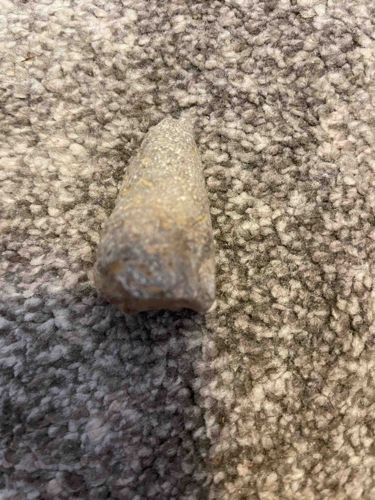
Belemnite Fossil Fragment
The item appears to be a belemnite fossil, characterized by its conical, elongated shape. It measures approximately 2-3 inches in length at its longest visible dimension. The material is a light grey to beige colored stone, indicative of a mineralized fossil. The surface is textured and appears somewhat granular, with visible speckles of lighter and darker material interspersed, suggesting a natural rock formation or fossilized remnant. One end tapers to a relatively sharp point, while the broader end, partially obscured in the image, seems to terminate in a more fractured or irregular break. There are no clear indications of manufacturing marks, signatures, or obvious repairs. The visible condition suggests natural wear and erosion consistent with geological processes and discovery, rather than significant post-excavation damage. There's a slight reddish-brown or earthy hue in some areas, likely due to mineral staining or sediment adherence. The item exhibits no polished surfaces or artificial shaping, strongly pointing toward its natural origin. Its quality is good for a natural specimen, with a distinct form that allows for easy identification. The estimated age would be Mesozoic Era, specifically from the Jurassic or Cretaceous periods, when belemnites were abundant.
AI-Generated Appraisal Disclaimer
Estimated Value
$10-25
Basic Information
Category
Fossil
Appraised On
February 26, 2026
Estimated Value
$10-25
Item Description
The item appears to be a belemnite fossil, characterized by its conical, elongated shape. It measures approximately 2-3 inches in length at its longest visible dimension. The material is a light grey to beige colored stone, indicative of a mineralized fossil. The surface is textured and appears somewhat granular, with visible speckles of lighter and darker material interspersed, suggesting a natural rock formation or fossilized remnant. One end tapers to a relatively sharp point, while the broader end, partially obscured in the image, seems to terminate in a more fractured or irregular break. There are no clear indications of manufacturing marks, signatures, or obvious repairs. The visible condition suggests natural wear and erosion consistent with geological processes and discovery, rather than significant post-excavation damage. There's a slight reddish-brown or earthy hue in some areas, likely due to mineral staining or sediment adherence. The item exhibits no polished surfaces or artificial shaping, strongly pointing toward its natural origin. Its quality is good for a natural specimen, with a distinct form that allows for easy identification. The estimated age would be Mesozoic Era, specifically from the Jurassic or Cretaceous periods, when belemnites were abundant.
Related Tags
Get Your Items Appraised
Instant estimates of your treasures with AI-powered instant appraisals